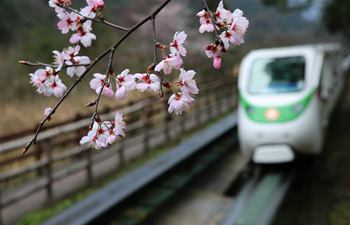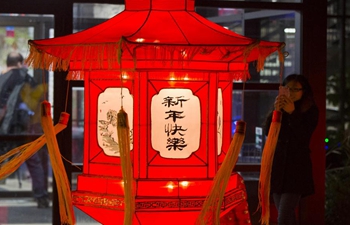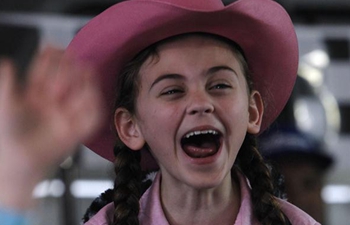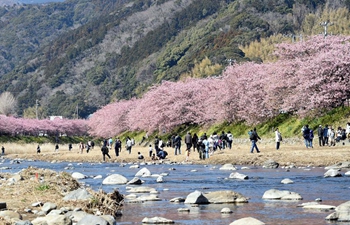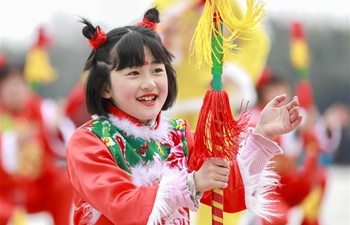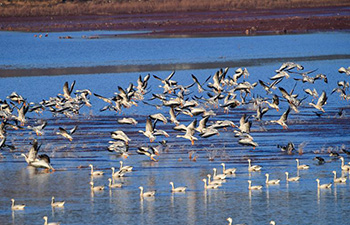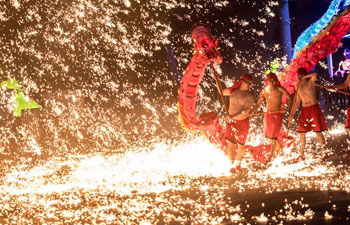
A Syrian soldier stands guard in the recently liberated Nashabiyeh town in the rebel-held Eastern Ghouta region, eastern countryside of Damascus, capital of Syria, on March 4, 2018. Syria's national TV said Sunday that the rebels in the capital Damascus' Eastern Ghouta area are "collapsing" as a result of the Syrian military offensive in that area. (Xinhua/Ammar Safarjalani)?
DAMASCUS, March 4 (Xinhua) -- Syrian President Bashar al-Assad said Sunday that the offensive against the rebels in the capital Damascus' Eastern Ghouta countryside will continue in tandem with allowing civilians to leave toward government-controlled areas in Damascus, as the Syrian army has made significant progress, capturing 36 percent of the areas held by the rebels.
Assad said most of the civilians in Eastern Ghouta want to leave the rebel-held areas toward government areas, noting that there is no contradiction between establishing cease-fire in that area to allow the civilians to leave and the military operation against the "terrorists."
Assad made the remarks as a Russian-backed partial humanitarian pause has been taking place in Eastern Ghouta to allow the civilians to leave that area since last week, while military operations continue after the end of the daily five-hour-long pause.
No civilians have left and no humanitarian convoys entered that area, with the government accusing the rebels of preventing the civilians from leaving.
In his Sunday comments, Assad said the Russian-proposed humanitarian pause balances between giving a space to the humanitarian work and at the same time achieving the goal of striking the "terrorists."
"This is why we must continue in this operation in tandem with giving the civilians the opportunity to leave toward the state areas (government-controlled)," he said.
He hailed the progress made by the Syrian army in that sprawling rebel-held enclave in the eastern countryside of Damascus.
Meanwhile, the War Media, the media wing of the Syrian army, said in a statement late on Sunday that the Syrian forces have made important progress in Eastern Ghouta over the past few days, capturing large swathes of areas in the eastern part of Eastern Ghouta, reaching the central sector of that area.
It said the Syrian army forces have captured 38 square km, or 36 percent of Eastern Ghouta, which is estimated at 105 square km.
The Syrian forces that are advancing from the eastern side are only 3 km from the military units in the western part of that rebel-held enclave.
When the two units meet, Eastern Ghouta would be split in half, the statement said.
As Assad has said that the military operations against the rebels in Eastern Ghouta, mainly the al-Qaida-linked Levant Liberation Committee (LLC), otherwise known as the Nusra Front, the humanitarian work, which has been hindered during the past days, is expected to continue as of Monday.
The United Nations said in a statement Sunday that it's planning to deliver humanitarian assistance to the rebel-held Douma district in Eastern Ghouta.
In a statement, the UN said the aid convoy will consist of 46 truckloads of health and nutrition supplies, along with food for 27,500 people in need and will be led by Ali Al-Za'tari, the UN Resident Humanitarian Coordinator.
"We hope that the convoy may proceed as planned and will be followed by other convoys. Our teams on the ground are ready to do all that is needed to make this happen," stated al-Za'tari, according to the statement.
The UN said it had received approval to deliver assistance for 70,000 people in need in Douma, adding that assurances were made that the remaining supplies for all approved people in need will be delivered on March 8.
The only UN delivery of assistance to Eastern Ghouta in 2018 was on Feb. 14, when a convoy with assistance for 7,200 people reached Nashabiyeh, said the statement.
Meanwhile, Syria' Deputy Foreign Minister Faisal Mekdad said the Syrian government is ready to send aid to Eastern Ghouta, noting that the rebels have targeted the crossing point into Eastern Ghouta.
Eastern Ghouta has been the major threat to Damascus since the rebels took hold in that area in 2012, with armed militants keeping launching attacks on the capital with mortar shells and in some instance through implementing incursion attempts.
Four major rebel groups are currently positioned inside Eastern Ghouta, namely the Islam Army, Failaq al-Rahman, Ahrar al-Sham and the LLC.
Eastern Ghouta has grabbed international attention recently since the military showdown started to gain momentum on Feb. 18.
The UN Security Council adopted Resolution 2401 on Feb. 24, which requires all parties in Syria to immediately cease clashes and provides a sustained humanitarian break for at least 30 days across Syria.
Two days later, the Russians demanded a daily humanitarian pause for five hours in Eastern Ghouta specifically.
But those initiatives have slightly reduced the number of rebels' mortar shells on the capital and the Syrian airstrikes and bombardment on Eastern Ghouta.
During the five-hour-long truce, the situation becomes calm, but the military confrontation continues right afterward.
The oppositional Syrian Observatory for Human Rights said the government forces' bombardment and airstrikes on Eastern Ghouta have killed over 600 people since the situation started flaring last month.




